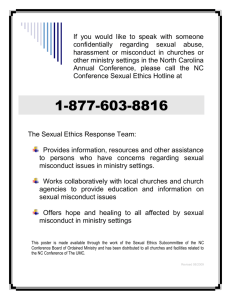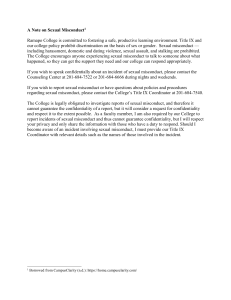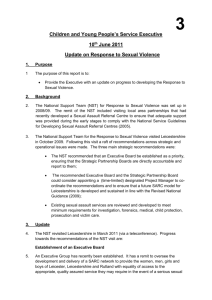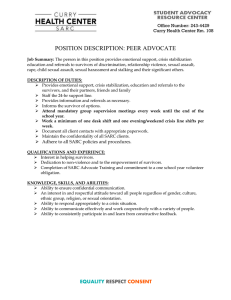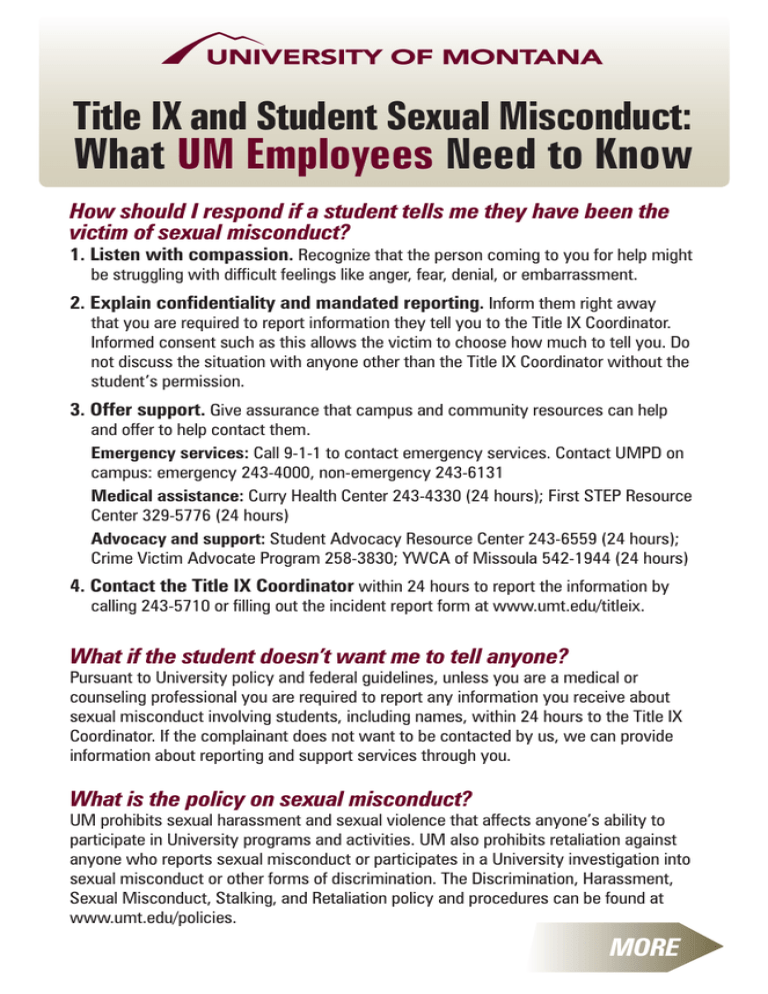
Title IX and Student Sexual Misconduct:
What UM Employees Need to Know
How should I respond if a student tells me they have been the
victim of sexual misconduct?
1. Listen with compassion. Recognize that the person coming to you for help might
be struggling with difficult feelings like anger, fear, denial, or embarrassment.
2. Explain confidentiality and mandated reporting. Inform them right away
that you are required to report information they tell you to the Title IX Coordinator.
Informed consent such as this allows the victim to choose how much to tell you. Do
not discuss the situation with anyone other than the Title IX Coordinator without the
student’s permission.
3. Offer support. Give assurance that campus and community resources can help
and offer to help contact them.
Emergency services: Call 9-1-1 to contact emergency services. Contact UMPD on
campus: emergency 243-4000, non-emergency 243-6131
Medical assistance: Curry Health Center 243-4330 (24 hours); First STEP Resource
Center 329-5776 (24 hours)
Advocacy and support: Student Advocacy Resource Center 243-6559 (24 hours);
Crime Victim Advocate Program 258-3830; YWCA of Missoula 542-1944 (24 hours)
4. Contact the Title IX Coordinator within 24 hours to report the information by
calling 243-5710 or filling out the incident report form at www.umt.edu/titleix.
What if the student doesn’t want me to tell anyone?
Pursuant to University policy and federal guidelines, unless you are a medical or
counseling professional you are required to report any information you receive about
sexual misconduct involving students, including names, within 24 hours to the Title IX
Coordinator. If the complainant does not want to be contacted by us, we can provide
information about reporting and support services through you.
What is the policy on sexual misconduct?
UM prohibits sexual harassment and sexual violence that affects anyone’s ability to
participate in University programs and activities. UM also prohibits retaliation against
anyone who reports sexual misconduct or participates in a University investigation into
sexual misconduct or other forms of discrimination. The Discrimination, Harassment,
Sexual Misconduct, Stalking, and Retaliation policy and procedures can be found at
www.umt.edu/policies.
MORE
What further training is available?
Contact Jessica Weltman, Title IX coordinator, or Kim Brown Campbell, campus
assault prevention coordinator, to arrange for additional training for your department
or class. SARC also provides a variety of training options, including first responder,
bystander, survivor assistance, and self-care training.
Contact
Title IX Coordinator: Jessica Weltman, 243-5710, jessica.weltman@umontana.edu
Report online: www.umt.edu/titleix
Survivor Support Tips from SARC
A person who survives sexual violence or discrimination may confide in a person they
know and trust before they contact a program like SARC. Thank you for making a
compassionate response when someone reveals a traumatic experience to you.
A referral to SARC is appropriate any time a student brings up issues of interpersonal
violence. Please give them the 24-hour support number, 243-6559, or direct them to
Curry Health Center. However, seeking assistance from any resource must always be
the survivor’s choice.
Do: explain confidentiality ∙ listen empathetically and without judgment ∙ give
emotional support ∙ thank them for trusting you enough to tell you
Good things to say: “It’s not your fault” ∙ “I believe you” ∙ “No one deserves to be
abused or assaulted” ∙ “Are you afraid?” ∙ “I am concerned for your safety” ∙ “I realize
this is a difficult thing to share and appreciate the courage it takes to talk about it” ∙
“How can I help?”
Do not: make light of the situation ∙ interrupt ∙ interject your feelings ∙ change the
subject ∙ press for more information ∙ touch them without their permission
If you have personal issues that might interfere with your response, you can express
your thanks for their trust in you and let them know that you need to get someone else
to help them. Please honor your boundaries while making sure the survivor receives
appropriate assistance.
A survivor’s story may affect you, and SARC services are available for you too. Trained
advocates are available to assist and support survivors and their friends and family,
and SARC provides consultation or training to employees in contact with a survivor.
SARC Main Office: 243-4429
24-hour Support Line: 243-6559
SARC
Curry Health Center East Entrance, upstairs and to the left, Room 108
www.umt.edu/sarc
STUDENT ADVOCACY RESOURCE CENTER
CURRY HEALTH CENTER

